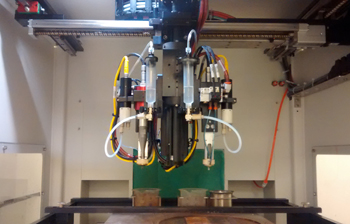Imagine being able to spray solar onto windows and buildings, turning bulky solar panels into first-generation technology. Until now, attempts have been too inefficient and expensive, but scientists at UK's University of Sheffield may have found an answer to creating "solar paint."
The key is an inexpensive mineral called perovskite, which absorbs light almost as well as silicon. Not only can it achieve conversion efficiencies of 19% - not far from 25% for traditional silicon - the process can be scaled for high volume manufacturing.
The process is similar to spray-painting cars, which would be another exciting application. It could leapfrog over using solar panels on car roofs to charge electric cars, as Ford is experimenting with, or even replace batteries altogether, giving us solar-powered vehicles.
Here's the equipment:
Using perovskite results in thin-film solar cells just half of micrometer thick. Fewer steps are needed in manufacturing and since it's a low temperature process, significantly less energy is used compared to silicon-based cells. The industry's hazardous waste would also be reduced and the small amount of lead that's necessary would come from recycled batteries. All these factors would make it easy to get to large scale cheaply, researchers say.
If all this is possible, the technology would open a world of new applications for solar, while significantly cutting the price.
"There's a lot of excitement around perovskite based photovoltaics," says Professor David Lidzey, lead researcher on the development team. "Remarkably, this class of material offers the potential to combine the high performance of mature solar cell technologies with the low embedded energy costs of production of organic photovoltaics."
"What we have done is replace the key light absorbing layer - the organic layer - with a spray-painted perovskite, which gives a significant boost in terms of efficiency," he explains.
Until now, spray-on solar using organic solar cells have plateaued at around 10% efficiency.
Source: http://www.sustainablebusiness.com/index.cfm/go/news.display/id/25853?utm_source=feedburner&utm_medium=feed&utm_campaign=Feed%3A+SBGeneralNews+%28SustainableBusiness.com+General+News%29

No comments:
Post a Comment